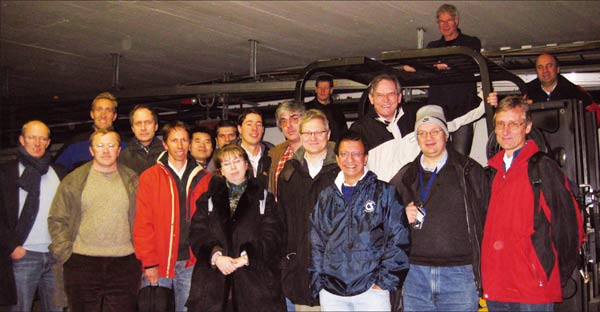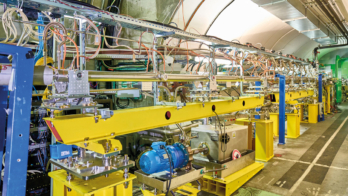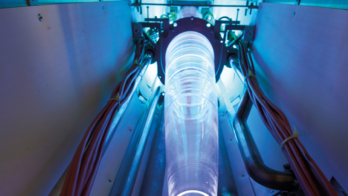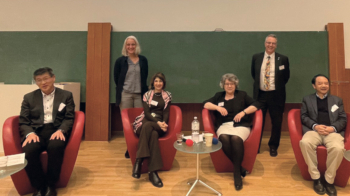
PPA09, a workshop held at CERN on proton-driven plasma wakefield acceleration, has launched discussions about a first demonstration experiment using a proton beam. Steve Myers, CERN’s director for Accelerators and Technology, opened the event and described its underlying motivation. Reaching higher-energy collisions for future particle-physics experiments beyond the LHC requires a novel accelerator technology, and “shooting a high-energy proton beam into a plasma” could be a promising first step. The workshop, which brought together participants from Germany, Russia, Switzerland, the UK and the US, was supported by the EuCARD AccNet accelerator-science network.
Plasmas, which are gases of free ions and electrons, can support large electric fields – a property that can be exploited to accelerate particles to relativistic energies over much shorter distances than is possible with current technologies. Past research has focused on creating large-amplitude plasma waves by injecting a short, intense laser pulse or an electron bunch into the plasma. Indeed, accelerating gradients up to 100 GV/m have been established over a centimetre with laser excitation and up to 50 GV/m over a metre with a short electron bunch as driver.
A recent proposal is to excite the plasma through a more energetic proton bunch. The maximum energy gain of electrons accelerated in a single plasma wake is limited to roughly twice the energy of the particles in the driving bunch. Given that protons can be accelerated to tera-electron-volt energies in conventional accelerators, it should be possible to accelerate electron bunches in the wake of a proton driving-bunch to energies up to the tera-electron-volt regime in one pass through the plasma.
The plasma wake produced by a 1 TeV proton bunch has been already investigated in computer simulations (Caldwell et al. 2009). The simulated electric fields are a factor of 100 higher than those considered for the International Linear Collider, and could lead to the acceleration of a bunch of electrons to several hundred giga-electron-volts within a few hundred metres (starting with a 1 TeV short proton bunch as driver).
So far there have been no beam tests with proton-driven plasmas. The primary goal of the PPA09 workshop was, therefore, to start the discussion on a pioneering experiment – using a proton beam from CERN’s Proton Synchrotron or Super Proton Synchrotron to demonstrate the generation of strong wakefields by a proton bunch. The preparation of a letter of intent for such experimentation at CERN was discussed in the workshop. One of the questions left open is the method for generating the required long, dense plasma. The workshop identified two options, which are now being pursued in parallel.
The workshop concluded that a first round of beam measurements, possibly in 2012, would search for modulations of a long proton bunch (rms bunch length around 15 cm). This effect is predicted by particle-in-cell simulations and its observation would provide an excellent benchmarking test. The goals for subsequent rounds of experimentation would include generating stronger electric fields in the plasmas by first longitudinally compressing or otherwise pre-modulating the proton bunch, and eventually, in 2014 or later, demonstrating the acceleration of an electron bunch in the wake of the proton bunch.
Chan Joshi, from University of California, Los Angeles, and one of the prominent researchers participating in PPA09, defined the medium-term goal of a CERN proton-driven plasma wake-field experiment as the demonstration of 1- GeV proton-driven acceleration in less than 5 m; its ultimate goal would be to accomplish 100- GeV acceleration over a distance of 100 m.
• More details of the workshop and all presentations can be found at http://indico.cern.ch/conferenceDisplay.py?confId=74552 and http://accnet.lal.in2p3.fr.
Further reading
A Caldwell et al. 2009 Nat. Phys. 5 363.





